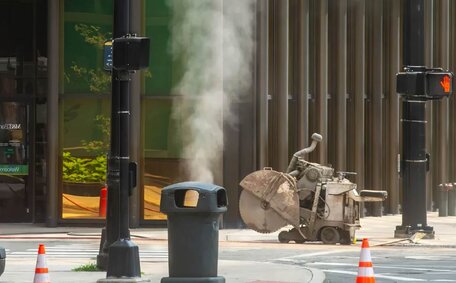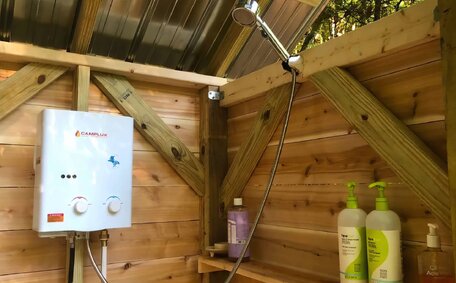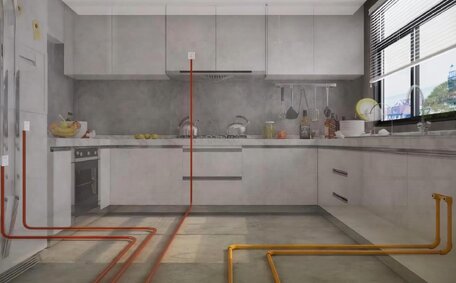
How To Move A Gas Meter
Need your gas meter relocated? You can’t move it yourself - contact your supplier to arrange for a gas engineer to reposition it safely. Charges may apply depending on circumstances.
Read MoreGas lines deliver natural gas or propane to appliances within homes and businesses. They play a critical role in providing fuel for heating systems, stoves, ovens, water heaters, and more. However, gas lines in your home can sometimes become damaged or spring leaks, necessitating professional repair.
If you notice a gas line leak, immediately call a licenced plumber or gas fitter.
Licenced professionals are equipped to identify and repair leaks, involving gas supply shut down, pressure testing, and damaged component replacement to ensure safe and functional gas flow.
Gas line repairs could take professional intervention and should never be attempted as a DIY project. Leaking natural gas lines pose serious risks including fire, explosion, and carbon monoxide poisoning. Only skilled professionals with proper safety certifications should handle work involved in fixing leaking gas on gas systems or appliances. They follow rigorous procedures tailored to different repair scenarios.
This article provides an overview of common problems requiring gas line repairs, step-by-step stages of the repair process, reasons to always hire an expert, and tips to prevent leaks in the future. Understanding professional gas line repair processes is essential for maintaining safety and preventing future leaks.
Gas line leaks pose serious health and safety hazards that require immediate attention. Natural gas leaks, composed of colourless and odourless methane, can induce symptoms like headaches and dizziness, with severe exposure risking loss of consciousness or death.
Leaking gas presents major fire and explosion risks. Natural gas is highly flammable and can ignite from a single spark or open flame source. This can lead to severe burns, property damage, injuries, or even fatalities.
Other dangers include the risk of carbon monoxide poisoning if gas leaks can enter an enclosed space. Carbon monoxide binds to red blood cells, preventing oxygen transport in the body. Symptoms like chest pain, confusion, vomiting, and coma can develop, eventually leading to death.
With all these severe risks, it is crucial to immediately evacuate the area and contact emergency services and a licenced gas fitter whenever a gas leak is detected or suspected.
Engaging in DIY gas line repairs is categorically hazardous. Only professionals have the proper tools, expertise, and training to safely diagnose and engage in fixing leaking gas issues.
Gas line leaks can stem from several common issues:
Over time, the cumulative effects of these factors cause materials to fail, compromising the integrity of gas line leaks in your home. Routine inspections by licenced gas fitters check for deterioration before leaks occur. but when damage occurs, immediate repair by qualified technicians is essential.
If you detect the distinctive rotten egg smell of natural gas or otherwise suspect a gas leak, immediate action is critical.
These steps are initial precautions to take while awaiting the arrival of qualified professionals equipped to fully assess the leak, repair any damage, restore regular gas supply, and confirm properties are habitable again.
Professional gas fitters use specialised equipment to accurately detect and pinpoint gas leaks. Specialised handheld gas detectors can identify the smallest amounts of natural gas leakage.
These detectors emit audible alarms and show numeric leak level readings when detecting gas. By methodically scanning all supply lines and potential leak points around valves or fittings, technicians can follow the detector’s rising alarm pitch and signal strength display to locate the exact position of any breaches.
Pressure testing is a further technique used to identify home gas line leaks. Pressure testing confirms whether pipe sections need repairs or replacement.
Technicians isolate individual appliances or sections of gas pipework and subject them to higher than normal gas pressures. They then use electronic manometers or pressure gauges to check for any pressure drops indicating a leak.
While natural gas itself is odourless, utility providers add a distinct 'rotten egg’ smell to act as an early warning sign of leaks.
So if you detect this unpleasant sulphurous odour and suspect a leak, ventilate the area, evacuate everyone, shut off the main gas valve, avoid flames or sparks, and call 000 immediately to request professional assistance.
Only professionally qualified gas fitters are authorised to conduct gas line repairs. They undergo extensive training and certification to safely handle all aspects of gas system repairs.
A licenced gas fitter’s responsibilities during tasks to fix leaking gas involve:
With specialised expertise in gas systems, materials, codes and safety procedures, gas fitters have the competency to conduct repairs ranging from minor leaks to full line replacements if deterioration warrants it.
DIY attempts at repairing gas lines carry catastrophic risks including fires, explosions, and gas poisoning. Menai Plumbing’s fully certified gas fitters have the training to safely assess issues and implement appropriate repairs for optimal safety and performance.
It’s extremely dangerous to attempt DIY repairs on gas lines and is highly discouraged. Professional involvement in gas line repair is crucial for several reasons:
Menai Plumbing’s expert gas fitters, with their experience and resources, ensure safe repairs given the zero margin for error.
Gas line repairs in Australia must adhere to strict industry standards and legislation to ensure safety for occupants and prevent risks to surrounding properties.
Key guidelines professionals follow include:
Guidelines regulate the use of proper materials, pipe sizing, jointing techniques, leak detection, purging, testing, and certification. Professionals like Menai Plumbing’s specially trained gas fitters stay up to date with all revisions to these codes. We ensure gas line repairs meet the latest editions as well as additional industry best practises.
Repairs that fail to adhere to codes and standards risk gas leaks reoccurring. They also increase dangers from toxicity, fires, or explosions due to substandard materials or techniques. Employing qualified experts ensures repairs meet high safety standards, mitigating risks to both life and property.
There are several effective gas line maintenance and leak prevention strategies homeowners can employ:
Given their cost and danger, effective prevention of gas line issues is critical. Menai Plumbing helps homeowners proactively maintain gas systems through regular servicing and responding urgently to any detected leaks. Contact our gas leak experts today to schedule inspections or repairs.
After completing a gas line repair, professional gas fitters always perform rigorous safety checks before allowing reoccupation and use. This critical process verifies repairs meet all codes, prevents any gas leaks and confirms appliances function correctly.
Key post-repair safety measures involve:
Only once all verifications are completed do professionals clear gas lines as safe for use. We take all precautions so homeowners can reoccupy properties assured of long-lasting, leak-free repairs meeting stringent codes. Trust Menai Plumbing’s certified experts to guarantee your family’s ongoing safety.
After completing repairs, gas fitters follow an important process to safely restore regular gas supply and relight appliances.
Menai Plumbing’s licenced technicians follow all safety precautions when restoring your gas systems after repairs. We ensure optimal performance and verify the absence of leaks prior to re-occupancy of properties. Trust our qualified gas fitters to guarantee safe and working gas supplies.
If you suspect a gas line leak or need repairs in the Menai, Sydney region, contact the professional technicians at Menai Plumbing today. With extensive training and certification, our qualified gas fitters have the expertise to safely assess issues and conduct necessary repairs.
We handle complete gas line repairs, from leak detection to pipe replacements, ensuring optimal safety and performance. Trust our experienced team, not DIY repairs, to prevent catastrophic risks from gas leaks.
For emergency or routine gas line repairs in Menai and surrounding suburbs, call Menai Plumbing on 1300 349 338 or email [email protected]. As local specialists, we respond promptly to repair leaks, restore smooth gas supply, and guarantee your ongoing safety.
Need your gas meter relocated? You can’t move it yourself - contact your supplier to arrange for a gas engineer to reposition it safely. Charges may apply depending on circumstances.
Read MoreInvesting in a solar hot water system can save up to 75% on water heating costs. With great returns and added home value, solar hot water can be a smart choice over electric or gas heaters. Contact us to see if it’s the right investment for your home.
Read MoreWhile natural gas and propane can both power appliances in your home, they have notable differences when it comes to BTU output, infrastructure, safety, cost and more. Understanding these key contrasts will help you determine which is better for your specific needs.
Read MoreMenai, 2234 NSW
We will call back as soon as possible.




